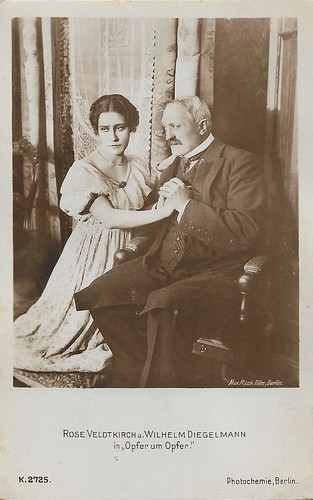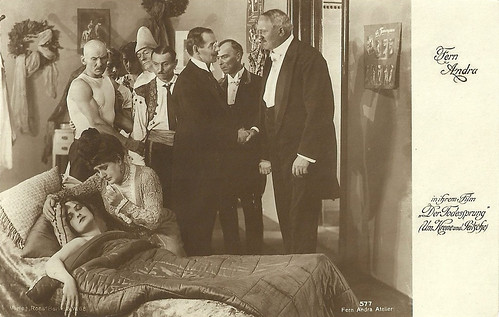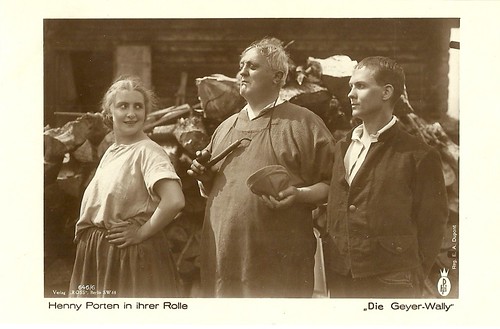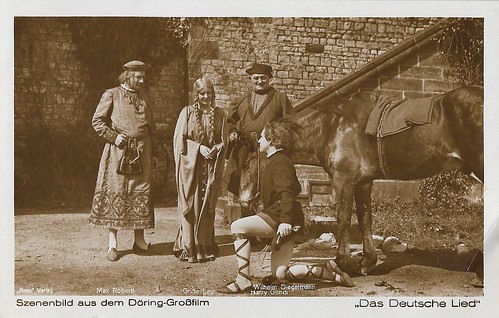
German postcard by Verlag Hermann Leiser, Berlin-Wilm., no. 7131. Photo: Hans Böhm.

German postcard by Photochemie, no. K.2725. Photo: Max Mack-Film. Rosa Veldtkirch and Wilhelm Diegelmann in Opfer um Opfer (Max Mack, 1918), starring Karl Beckersachs. The film is lost.

German postcard by Ross Verlag, no. 989/3. This postcard is dated: Stuttgart, 19 June 1925. Photo: Ufa. Wilhelm Diegelman as Uncle Uhl in Kampf um die Scholle/Struggle for the Soil (Erich Waschneck, 1925).

German postcard by Ross Verlag, Berlin-Wilm., no. 1555/1, 1927-1928. Photo: A. Binder, Berlin.
Father figure, bishop or innkeeper
Wilhelm Diegelmann was born in 1861 in Ellers, Neuhof, Electorate of Hesse, now Neuhof, Hesse, Germany.
Diegelmann's first stage appearance was in 1878 in the chorus for the Frankfurt Opera. In 1881 he debuted at the Frankfurt City Theater, playing Wallenstein, Nathan the Wise, King Lear, William Tell, and other title characters.
In 1907, Diegelmann relocated to Berlin. Here, he appeared at the Deutsches Theater, but later also at the Berliner Theater, the Großes Schauspielhaus, and the Deutsches Künstlertheater. After decades of stage acting, he appeared in Max Reinhardt's film Die Insel der Seligen/The Islands of Bliss (1913) starring Ernst Hoffmann and Ernst Matráy.
Diegelmann started a parallel, second career as a silent film actor in 1913. In the following years, the likeable actor played in countless films, often in artistic demanding and successful works like Ernst Lubitsch's comedy Prinz Sami (1917) and the cinematic highlights Carmen (Ernst Lubitsch, 1918) and the groundbreaking gay-themed film Anders als die Anderen/Different from the Others (Richard Oswald, 1919).
In German silent cinema, he became a prolific actor in supporting roles, often as a father figure, guard, bishop or innkeeper, both in dramas and comedies. Between 1913 and his death in 1934 he played in 247 films, including also some ten German early sound films. At Cyranos, Thomas Staedeli writes: "The actor Wilhelm Diegelmann belongs to the primary rock of the German silent movie."

German postcard by Photochemie, Berlin, no. K. 1994. Photo: Union Film. Erna Morena and Wilhelm Diegelmann in Prima Vera (Paul Leni, 1917), based on Alexandre Dumas fils's novel and play 'La dame aux camélias'.

German postcard in the Film Sterne series by Rotophot, no. 563/3. Photo: Richard-Oswald-Film. Postcard for the German silent film Das Dreimäderlhaus/The House of Three Girls (Richard Oswald, 1918), considered a lost film. It tells about the life of composer Franz Schubert (Julius Spielmann, the man with spectacles in the middle here). Right of Spielmann stands Conrad Veidt, who plays Baron Schober, while the tall, sturdy man on the left may be Wilhelm Diegelmann (Tschöll). The three daughters are played by Sybile Binder, Käthe Oswald, and Ruth Werner.

German postcard by Ross Verlag, no. 577. Photo: Fern-Andra-Atelier. Fern Andra, probably Olga Engl and Wilhelm Diegelmann in Der Todessprung/Um Krone und Peitsche/Crown and Whip (Georg Bluen, Fern Andra, 1919).

German postcard by Ross Verlag, no. 646/6. Photo: HPF [Henny Porten Film]. Henny Porten in Die Geyer-Wally/Die Geier-Wally (E.A. Dupont, 1921). Although drama and romance dominate, the film has some witty scenes, such as the one in which Wally rejects the marriage proposal by farmer Rosenbauer senior (Wilhelm Diegelmann) and his son (Gerd Fricke).
Lubitsch, Lang, Murnau and Von Sternberg
Wilhelm Diegelmann became the epitome of Weimar cinema. He played in famous titles such as the comedy Robert und Bertram, die lustigen Vagabunden/Robert and Bertram (Max Mack, 1915), the historical film Veritas Vincit (Joe May, 1919), the adventure fantasy Das indische Grabmal/The Indian Tomb (Joe May, 1921), Der müde Tod/Destiny (Fritz Lang, 1921), the farcical comedy Die Bergkatze/The Wild Cat (Ernst Lubitsch, 1921) starring Pola Negri, Phantom (F.W. Murnau, 1922) with Alfred Abel and Kampf um die Scholle (Erich Waschneck, 1925) as well as in lesser-known films.
He worked with reputed directors such as Max Mack, Paul Wegener, Joe May, Ernst Lubitsch, Paul Leni, E.A. Dupont, Fritz Lang and F.W. Murnau and acted opposite all the famous actresses of the German silent cinema: Mia May, Erna Morena, Pola Negri, Fern Andra, Asta Nielsen, etc.
In particular, he often costarred with Henny Porten in films like Die Wellen schweigen/The waves are silent (Rudolf Biebrach, 1915), Feeënhande/Fairy hands (Rudolf Biebrach, 1917), Monika Vogelsang (Rudolf Biebrach, 1920), Anna Boleyn (Ernst Lubitsch, 1920), Die Geierwally/The Vulture Wally (Ewald André Dupont, 1921), Mutter und Kind/Mother and Child (Carl Froelich, 1924), and Violantha (Carl Froelich, 1927). He was paired with comedians such as Anna Müller-Lincke, Senta Söneland, Ernst Lubitsch, Mady Christians, Lya Mara, and Reinhold Schünzel, but also with crime fighters like Carl Auen, Ernst Reicher and Max Landa.
In the sound era, he performed in the classic Der Blaue Engel/The Blue Angel (Josef von Sternberg, 1930), where he played a ship captain who flirts with the singer Lola Lola (Marlene Dietrich) and promptly feels the jealousy of her new husband (Emil Jannings). He also appeared in Harry Piel's Der Geheimagent/Secret Agent (Harry Piel, 1932) and the Nazi propagandafilm Hans Westmar (Franz Wenzler, 1932).
His final film was the Theodor Storm adaptation Der Schimmelreiter/The Rider on the White Horse (Hans Deppe, Curt Oertel, 1934) starring Mathias Wieman. After this, Diegelmann continued to make stage appearances, with his last role being in 'Rembrandt vor Gericht' (Rembrandt in Court) by Hans Kyser. He died not long after this in 1934 in Berlin, at 72. He was interred at the Südwestkirchhof Stahnsdorf near Berlin, though the grave no longer exists.

German postcard by Ross Verlag, no. 700/9. Photo: Ufa. Publicity still for Kampf um die Scholle/Struggle for the Soil (Erich Waschneck, 1925) with Oskar Marion as Franz, the younger brother of estate owner Axel, who has an affair with Luise (Mary Parker), daughter of the estate manager Karl Marten (left; Otto Kronburger). The man behind Parker is Wilhelm Diegelmann, who plays Uncle Uhl. The man left of him is Otto Kronburger, who plays Luise's father, Karl Marten.

German postcard by Ross Verlag, no. 68/4. Photo: A. Schmoll, Berlin / Henny Porten-Film. Henny Porten and Wilhelm Diegelmann in the German silent drama Violantha (Carl Froehlich, 1927).

German postcard by Ross Verlag, unnumbered. Publicity still for the German silent film Das Deutsche Lied (Karl Pindl, 1928), produced by the Döring film company, Hannover, under the guidance [Protektorat] of the Deutsche Sängerbund (DSB). Premiered in Vienna, Austria, at the 10th German Sängerbundesfest 19.-23.July 1928. Here Gritta Ley as Irmgard, Harry Gondi as Walther von der Vogelweide, and Wilhelm Diegelmann as Burgvogt, in the historical part of the film.

German postcard by Ross Verlag, unnumbered. Max Roberti as Graf Kuno von Eisack, Gritta Ley as his daughter Irmgard, Harry Gondi as Walther von der Vogelweide, and Wilhelm Diegelmann as Burgvogt in Das Deutsche Lied (Karl Pindl, 1928), produced by the Döring film company, Hannover, under guidance [Protektorat] of the Deutsche Sängerbund (DSB). Premiered in Vienna, Austria, at the 10th German Sängerbundesfest 19.-23.July 1928.
Sources: Thomas Staedeli (Cyranos), Wikipedia (English and German) and IMDb.
No comments:
Post a Comment